|
It's
National Dog Week Sept. 24-30
Where
to find great dogs
that don't cost a bundle
[SEPT.
28, 2000] Set
back off the road at 1515 N. Kickapoo sits Logan County Animal
Control. Originally they were located out at the Scully Farm and
were known as American Humane. They moved to the new site in 1989
and became Logan County Animal Control.
|
|
Logan
County Animal Control
The
county agency serves many functions. They provide pickup of domestic
nuisance animals; care for and maintain the animals that were
brought in by their owners or that they went out and picked up;
handle dog license registration; and arrange adoptions. They also
provide limited veterinarian services for spaying, neutering and
declawing (cats only declawed at time of fixing) for adoptees.

The
staff is made up of two full-time employees and a veterinarian who
comes in as needed. In charge of the facility is Warden Sheila
Farmer. Farmer, a mother of young children, began working at the
Logan County Animal Control six years ago. Before working there she
groomed dogs. She’s had a lifelong love of animals and now works
with them, lots of them, every day. She bestows her love and care on
an average of 100 newly brought in animals per month.
Warden
Farmer’s duties include pretty much everything there is to do in
running the facility. She does the office work, answers calls, does
the bookkeeping, processes papers, then records and files lots of
them. She schedules appointments for veterinarian services of
animals that have been adopted from there. She cleans the floors and
the animal cages, feeds the animals, takes all the dogs out daily,
and goes out to pick up nuisance domestic animals all around the
county. Not many days are easy, though some are better than others.
Most days are hectic, with lots of people coming in and calling with
questions. Lots of days it’s nonstop, exhausting and difficult to
get everything done, but she knows this leads to adoptions quite
often. Farmer puts in 40-plus hours per week.

So,
what makes it a job she says she likes? Farmer lights up, softly
saying, "I love animals! Getting them together with people for
adoption is a great feeling. They’re so happy to get out!"
The
worst part of Warden Farmer’s job is, as you can probably guess,
knowing a good animal is out of time. "I don’t like putting
animals to sleep. I’d rather see them adopted," she says
sadly.
Farmer
herself now has three dogs and five cats, all adopted from Logan
County Animal Control.
Working
right alongside Farmer performing all the same duties is
gentle-natured Assistant Warden Michelle Mote. Like Farmer, Mote
shares all the duties for keeping everything running in the facility
— from office work to cleaning the facility, caring for the
animals by taking the dogs out, cleaning the dog and cat kennels,
and feeding everyone and giving them some attention, as much as is
possible in spare moments. She works 38 to 40 hours per week.

Mote
says it was just "lucky timing" that she got her job
there. She started in February. She, too, loves animals and was
looking for a new job when she found this one.
When
you see her with the animals you can see how much she likes them.
She’s very easy and loving with them. She brings out the dogs each
week for LDN to take their pictures, speaking nicely to them and
patiently handling them.
She
has recently adopted a cute little longhaired calico she named
Sassy. She was able to see her as a newborn there.
Assistant
Warden Mote's answers are the same as Warden Farmer when asked about
her favorite and worst part of the job. "The best part is the
animals. I love them." The worst part is "putting them
down" when they don’t get adopted.
Dr.
Lester Thompson is the house veterinarian. Limited veterinarian
services are provided for adoptees from the facility. Appointments
are made for spaying and neutering before the animals go to their
new homes. Cats may be declawed at the same time as fixing.
Dr.
Thompson was not available for interview this week. He will be
interviewed sometime in the future.
Farmer
and Mote run the entire daily operation of the large facility. These
two hard-working women deserve our respect and appreciation for
their dedicated hard work and doing an emotionally challenging job
as well! Be sure to tell them how much you appreciate the
availability of the facility and the work they do there.
[to top of second
column in this article]
|

If
you’re looking to adopt, call Logan County Animal Control at (217)
735-3232 or stop in and pick one out at 1515 N. Kickapoo in Lincoln.
The
facility also accepts monetary and product donations.
Regional
sources of
shelters, humane societies, animal controls
You
love animals, except for one reason or another can't have a pet. So
how can you help your local animal control or animal shelter?
Whether or not your local animal control or shelter receives tax
dollars, they always appreciate donations. The donations may be
monetary, time (some locations) or consumable products. Animal
controls and animal shelters obviously need a lot of food, toys,
hay, shavings, liter and shampoo, but they can also use cleaning
products for the facilities and office products for the front desk.
Please call before you donate items, as different locations may
require different products.
If
you have room for a pet in your home, think about adopting one of
the animals waiting at animal control or a shelter. You can go in
and visit the animals until you find the perfect match. Usually the
animal keepers can tell you a little something about the animals.
They can help recommend the cat or dog that fits your preferences.
Adoption is a lifelong commitment that will enrich your life and the
life of your new friend.
The
fees are nominal, and help defray the cost of the medical care your
pet received while at the shelter. If you are able to give an
additional donation when you adopt, it will help feed and care for
the other animals still waiting for a home. All of your efforts are
greatly appreciated.
The
best way you can help animal control and local shelters is to have
your pet spayed or neutered. Some shelters receive as many as 7,000
animals annually. In just seven years, two dogs and their offspring
have the potential to produce 4,372 more dogs, and two cats and
their offspring could produce 420,000 more cats. If you have your
pet spayed or neutered, you can help prevent future animal control
problems.
If
your pet disappears, call as many shelters as you can as soon as
possible. Animals can cover amazing distances, so try shelters even
if you think they may be too far away. If animal control workers
have a description of your pet, they can help watch for it and
identify it when it is brought in. If your pet appears at animal
control or a shelter, it is important that you retrieve your pet as
soon as possible, because they have a limited amount of space.
Remember to keep your pet’s tags on him at all times, because you
never know when he might wander away.

Lastly,
how can they help you? Visit their website, or any humane society
website, for valuable information on all sorts of animal care.
The
Humane Society of Southern Illinois (www.geocities.com/morganarowan52/)
lists household dangers for pets — many dangers are the same as if
you had a baby or toddler in your home. Also, they give information
on three animal control facilities in southern Illinois.
The
Champaign County Humane Society (www.cuhumane.org)
offers a pet library that covers topics such as behavior, care and
human-animal bonds. It posts recent legislation about animals, an
alumni page to view happy-ending adoptions and a calendar of events.
McLean
County Humane Society (http://cube.ice.net/~mchs/main.htm)
gives a specific list of common, poisonous plants pet owners should
avoid. They say even a nibble can cause illness or death.
A
simple search on any search engine will provide a flood of animal
resources and ideas for where one might volunteer.
[Jan
Youngquist and Jean
Ann Carnley]
|
|
10 Reasons to Adopt a
Shelter Dog
1. I'll bring out your
playful side!
2. I'll lend an ear to
your troubles.
3. I'll keep you
fit and trim.
4. We'll look
our for each other.
5. We'll sniff
out fun together!
6. I'll keep you
right on schedule.
7. I'll love you
with all my heart.
8. We'll have a
tail-waggin' good time!
9. We'll snuggle
on a quiet evening.
10. We'll be
best friends always.
|
|
Think
You're Pregnant? WE
CAN HELP.
Free
and Confidential:
Pregnancy Testing. Information and Counseling. Supportive
Services. "A
CRISIS PREGNANCY CENTER"
#5 Arcade Building, Lincoln |
Claire's
Needleworks
and Frame Shop
"We
Frame It All"
On the square
in downtown Lincoln
217-732-8811
M-F 10-5 Sat 10-4
cmstitches@aol.com |
Gossett's
Cleaners
will soon be closing to move into our brand new facilities
at 621 Woodlawn.
Please
pick up any overdue orders. We regret any inconvenience to our
customers. |
|
|
|
Dog
rescue: A second chance
By Cherie Rankin
[SEPT.
27, 2000] Have
you been longing to open your home, your family and your heart to a
homeless dog? If so, there may be an avenue open to you that you
aren't familiar with: dog rescue. What is dog rescue, you ask? In a
nutshell, it is groups of dog-lovers, usually breed-affiliated,
looking to save homeless canines from being euthanized and to save
at-risk dogs from bad living conditions. Their ultimate goal is
giving these dogs a second chance at a happy life.
|
|
I
am a member of one such group, Northern Illinois Samoyed Assistance
(NISA). NISA is a dog rescue organization which takes in homeless
and at-risk Samoyed dogs. The dogs are picked up as strays, rescued
from animal shelters, surrendered by their owners (for a variety of
reasons) or rescued from abusive situations. There have even been
instances where dogs were rescued from puppy mills.
The
Samoyed breed is not unique in this regard. Across the country,
there are breed rescue organizations for all breeds of dogs
recognized by the AKC (American Kennel Club).
What
does rescue do for the dogs that come under their care? You name it,
they do it. Rescued dogs receive medical care, including heartworm
testing, proper vaccinations, general checkups and treatment of any
health conditions which are found. Dogs are cleaned and groomed.
Spaying or neutering is also performed, and, in most cases, is
mandatory before a dog can be adopted.
Once
medical and grooming issues are taken care of, rescued dogs are
placed in "foster homes" until permanent homes can be
found. Rescue foster homes observe the dog, assess its temperament
and try to socialize and/or train the dog if there are any problem
areas. The goal here is to help the dog feel secure with people and
to work out behavioral problems which might interfere with finding
the dog a permanent home.
The
primary goal is, of course, to take a dog which has come from a
less-than-perfect situation and to find it a loving, responsible
home. And rescue organizations do not take this task lightly. They
have invested time, money and effort in the rescued dog and desire
nothing less than to try and ensure that its new home will be safe
and secure. Rescue organizations, more often than not, carefully
screen potential new owners to make sure that they understand the
responsibility of taking on a pet. Potential owners must fill out
questionnaires, open their homes for "home checks," agree
to the conditions set forth by the rescue organization and sign a
contract to that effect.

Most
rescue organizations have a standard adoption contract which the
potential owner must sign upon adopting a dog. Clauses might
stipulate that the new home have a fenced yard or that the dog never
be left out unsupervised. A common stipulation is that if the new
home "doesn't work out," for whatever reason, the dog
should be returned to the rescue organization and not turned over to
a shelter or given away.
Potential
owners must also pay a fee to the rescue organization to help cover
the costs involved — a fee that varies from one organization to
the next. Paying upwards of $100 for a rescued dog is not uncommon;
however, considering the wonderful care, both medical and emotional,
that the dog has been given by the rescue organization, the cost
does not seem high.
In
contrast, buying a puppy (or even an older dog) from a breeder is
much more expensive. Also, a rescued dog has most likely already
been spayed or neutered. It has most likely been socialized around
people and given some basic training before being placed for
adoption. The rescue organization can also give potential owners a
lot of information about the dog, especially regarding its
temperament and health conditions, which removes a lot of the
guesswork involved in bringing home a "secondhand" pet!
[to top of second
column in this article]
|

[Cuzack is a yellow Labrador retriever. Esther Sparks
adopted him from the Springfield Animal Shelter. He's about 8 years
old, a marvelous dog and very dear to her.]
Perhaps
most valuable is the relationship the new owner forms with the
rescue group. Rescue organizations are more than willing to educate,
to answer questions, to assist with problems. Their goal is to give
the rescued dog a new shot at happiness, and that involves working
with adoptive families to make sure that everybody is happy in the
new arrangement!

A
large number of rescue organizations have websites, which list their
philosophies and adoption criteria and often have pictures and
descriptions of available dogs. One such example is the NISA website
at http://www.samfans.org/nisa.
At the site, there is an example of a contract, as well as
organizational information.
Other
websites with breed rescue information include these:
http://dogzone.com/rescue.htm
http://woofs.org/adoption/newlist.html
http://infodog.com/ads/rescue/rescue.htm
And
the American Kennel Club has a central, state-by-state list of
rescue contacts for each breed, as well as valuable breed
information. Their site is at http://www.akc.org/breeds/rescue.cfm.
So
if you have the space, in your home and in your heart, there are
rescued dogs of all breeds just waiting for a second chance. Giving
an adopted dog a happy home can be one of the most rewarding things
you can do — for yourself AND for the dog!
[Cherie
Rankin]

|
|
|
Animals
for adoption
These animals and
more are available to good homes from the Logan County Animal
Control at 1515 N. Kickapoo, phone 735-3232.
Fees for animal
adoption: dogs, $60/male, $65/female; cats, $35/male, $44/female.
The fees include neutering and spaying.
Logan County Animal
Control's hours of operation:
Sunday – closed
Monday –
8 a.m. - 5 p.m.
Tuesday –
8 a.m. - 5 p.m.
Wednesday – 8 a.m. - 5 p.m.
Thursday –
8 a.m. - 5 p.m.
Friday –
8 a.m. - 3 p.m.
Saturday –
closed
Warden: Sheila Farmer
Assistant: Michelle Mote
In-house veterinarian: Dr. Lester Thompson
|
DOGS
National Dog Week finds Logan County Animal Control with a
wide range of choices to select from in the dog department. Big to
little, most these dogs will make wonderful lifelong companions when
you take them home and provide solid, steady training, grooming and
general care. Get educated about what you choose. If you give them
the time and care they need, you will be rewarded with much more
than you gave them. They are entertaining, fun, comforting, and will
lift you up for days on end.
Be prepared to take the necessary time when you bring home a
puppy, kitten, dog, cat or any other pet, and you will be blessed.
|
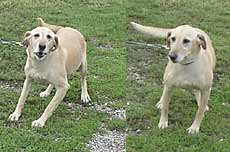
Golden
Labrador
[Golden Labrador Barley is a 4-year-old golden
Labrador. She's spayed, housebroken, had shots. She's good with
children. Unfortunately for her, she lived in a house where they had
so many children they didn't know what to do. They had more than
they could take care of with too many children and a dog. So if you
have a small family and are in need of a playful dog, try Barley.]
|
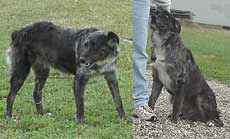
Australian shepherd
[Patches is only 3 years old. She's spayed and had her shots. She
will melt your heart when she meets you with her tender gaze. She's
good with kids and has a sweet personality. If you look up the
characteristics of the breed, you'll see what great potential she
has. They are known for their agility, obedience and faithfulness.]
|

Cocker
[This
cute little dog will be magically transformed from pauper to prince
with some soap and water and a trim.
He’s a stray with little known about him.
He’s friendly, young and very personable, and when he gets
cleaned up — look out — he’ll be beautiful.
People will stop you and ask where you got such a beauty, and
he’ll look at them as though saying, “Yes, I am handsome, I like
you too!”
He’ll need to be exercised or have an opportunity to run
off some of his energy.
Full of charm, he will be full of play and make a delightful
pet.
Give this dog a name and a place to call “his” home.]
|
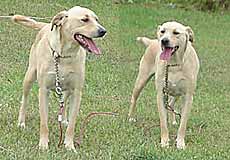
Yellow Labrador
[Scooter
has character. A 2-year-old female that’s good with kids, she has
shots and records. Her
family is moving to a place where they can’t have pets.
She would make a wonderful pet for the family to wear out or
vice versa.]
|

Rat terrier
[Speck is a young, lively 10-month-old male rat
terrier. Speck has personality that goes. He's energetic, personable
and loves to show off striking pretty poses. Not a lot has been
observed about this dog, as he was new in on Friday. His family just
had no time to take care of him. So, if you want a fun, promising
smallish dog, Speck is waiting for you.]
|

Black Pomeranian
[Smokey
is an energetic, 2-year-old male.
He was brought in. He is housebroken and would like a good home.]
|

Chow — Chihuahua and ? mix
[This
cute little dog has a lot of personality.
Not much is known her, as she was a stray, but she has a good
little disposition. It is thought she might do better with an older
person.]
|

Boston terrier
[Sissy
is a 2-year-old Boston terrier.
Born on a farm, having received very little attention, she is
very shy. She has not
been housebroken, living on the farm.
It will take some work to earn her trust, but the payoff will
be great. Once they got
to know her, the keepers found she is one of the sweetest dogs they
have ever met. That says a lot! So
if you’re looking for a close companion and are willing to give a
little training and lots of tender, loving care, Sissy should be
yours. She’s very
pretty too!]
|
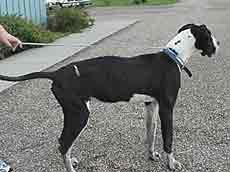
Great Dane
[If
you want something big and friendly, this is your dog!
A stray, he hopped into a small car with a guy who stopped
for gas. They drove to
the Animal Control, and the dog would not get out.
So, he’s a good rider companion. You could have some fun
with this big, lovable dog.]
|

|
|
ILLINI
BANK
2201
Woodlawn Rd. in Lincoln
1-888-455-4641 or 735-5400
Ask for Terry Lock or Sharon Awe Ask
about our 7% APY CD
7 mo. - $5,000 minimum |
Lincoln's
Original 10-minute
Oil Change Greyhound
Lube At
the corner of Woodlawn and
Business 55 No
Appointments Necessary |
Meador
Investigations
– michael@pi-pro.com –
217-376-3255
IL
License # 115-001499
Click
here to visit your local Private Investigator
www.pi-pro.com
|
|
CATS
Many of the same cats are still available, with a few new
ones added. The gorgeous white cat with two different color eyes is
looking very dejected. His master died and there's no one to take
him. There are a number of other fine cats there too!
|

[Casper’s former owner passed
away, and Casper needs
a new home. The most
distinctive feature of this large white cat is her two eyes:
one bright blue and one bright green.]
|

|
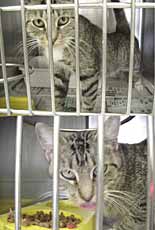
|

|

|

|

[Oreo
is a cuddly and lovable
longhaired tiger cat. She
is 1½ years old,
spayed, declawed, and would be good for a home with kids.]
|

[Stormy’s former owners moved and
could not keep her. Stormy
is 1 year old, smart
enough to open her own cage, and she is good with children.]
|

[This
cat will add humor to your home.
He is a ham and loves attention.]
|

[Buttons is a good-natured
cat that is spayed. Please
add this 1-year-old kitty to
your family].
|
|
|
|
Brought
to you by Best Friends Animal Hospital
It's
National Dog Week Sept. 24-30
How
to find the perfect
canine "best friend"
[SEPT.
25, 2000]
It's
National Dog Week! If you've been contemplating adding a puppy or a
dog to your family, there is much to consider to ensure that your new
canine companion that will be a good fit — both for your family and
for your lifestyle.
|
|
First,
be honest with yourself about how much time and money you have
available to devote to a puppy or a dog. Then, do some research
— on the Internet, in books and with breeders — to find a
breed which will suit your situation. Breeds of dogs differ in the
amount of exercise and grooming they require. Some breeds are
highly independent and stubborn, while others are more readily
"trainable." Some breeds require a lot of activity and
stimulation to keep them entertained and out of trouble! And, of
course, some breeds grow much larger than others and require a lot
of space.
If
there are children in your family, that too must be considered.
Some breeds are known to be good with children, while other breeds
tend to be more "high strung" and are not a good mix in
families with small children.

Don't
forget about the financial commitments either. Quality food,
veterinary care, routine vaccinations, licensing fees, leashes,
crates and/or kennels, toys and chewies, and grooming supplies can
add up. There is no such thing as a "free" dog!
With
a puppy, training and housebreaking can (and should) be
time-consuming activities. There will be puppy-related
wear-and-tear on your house. There will be accidents, as
housebreaking won't happen overnight. A puppy must be properly
socialized and trained in order to be a well-mannered member of
your household. Remember that a majority of dogs wind up in
shelters or abandoned NOT because they "bad dogs" —
they wind up there because their owners either didn't take the
time to train them properly or got tired of the responsibility.
Make sure this isn't going to be you!

[Rollie is a 2-year-old adoptee owned
by Cherie Rankin.]
If
the responsibility of a puppy sounds like more than you want to
take on, there are other options. Animal shelters and breed rescue
operations have countless dogs available that need loving,
responsible homes. With a little time and research, you can find a
dog of almost any breed or mix that is available for adoption.

Of
course, with an older dog, there may be other issues to consider.
An older dog may have special health needs. In this case, be sure
that you are able and willing to meet them, both emotionally and
financially. Potential owners are often afraid of adopting an
older dog. These people might be pleasantly surprised! Older dogs
are often calmer than their younger counterparts, demand less
exercise and may already be well-trained. And as veterinary care
technology advances, the life span of our canine companions keeps
increasing. An older dog may, in all likelihood, have years of
love and companionship to offer you.
[to
top of second column in this article] |

Do
your homework! In her online article "Choosing the Right
Dog," Sari B. Tietjen makes the following suggestions.
—
There is no substitute for making a careful study of each breed's
characteristics and narrowing down the field until you are left
with the one that best suits your temperament, lifestyle,
accommodations and taste.
—
Go to a dog show, buy dog books, consult websites and search out
legitimate kennels. Talk to breeders and other experts about the
breed you are considering.
If
you decide a puppy is what you want, find a breeder who will work
with you and answer your questions. DO NOT buy from pet stores or
wholesalers. Ask to see the puppies' parents. Make sure that the
parents are certified for hip and eye health and that they have
good temperament. Pick a puppy who appears healthy and whose
temperament seems well-adjusted. Then take it home and be a
responsible owner!

If
you decide that you would prefer an older dog, locate the breed
rescue group for the breed you desire, or check your local animal
shelter for a dog that suits you. Quality rescue and shelter
organizations are more than willing to work with potential owners,
as their top priority is finding good homes for the animals in
their care!
There
is a wealth of information available to you to help in your search
for the perfect canine companion. Good breeders are more than
happy to talk to you about their breed. Books on specific breeds,
their characteristics and the commitment required of an owner
abound. And, of course, the Internet has some wonderful sites. Two
excellent sites are:
Dog
Owner's Guide — The Online Magazine for Pet and Showdog Owners,
at http://www.canismajor.com/dog/chbreed.html
The
American Kennel Club website, at http://www.akc.org
(The
AKC site has links for both breeder referral and breed-specific
rescue contacts.)
If
you invest the time in finding the perfect canine match, your dog
will reward you with years of loyal companionship, countless happy
memories and unconditional love. Happy searching!
[Cherie
Rankin]

|
|
Back
to top |
|
Top
Stories | Sports
News | Sports
Talk | Area
Athletes in Action | Out
and About | TechLine
| Weather
| Elsewhere
A
Day in the Life... | Milestones
| Obituaries
| Diaspora
Business
& Ag | Organizations
| Events
| Good
Neighbors | Honors
& Awards
Ombudsman
| Law
& Courts | Rural
Review
Crosswords
| Games
The
Arts | Home
and Family | Spiritual
Life | Health
& Fitness | Teaching
& Learning | Book
Look | Movies
& Videos
Still
Waters | The
Hallway Buzz | What's
Up With That? | Where
They Stand | the
em space
How
We Stack Up | By
the Numbers
Letters
to the Editor | About
LDN | Corrections
| Happy
Ads | Quick
Coupon Clip-Outs
|
|

